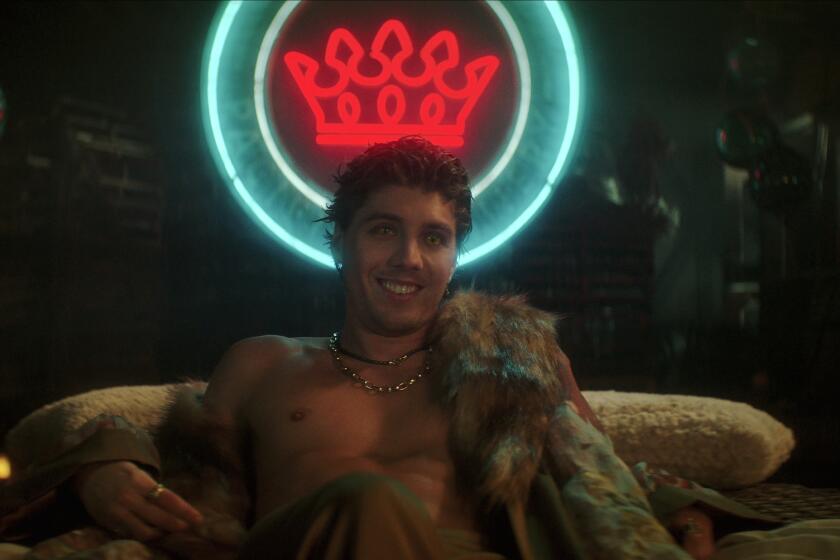TELEVISION REVIEW : The audience won’t be held captive
For its third original dramatic series, AMC has chosen to reimagine -- as a six-episode miniseries that will run in a clump from Sunday to Tuesday -- Patrick McGoohan’s 1967 British spy-fi show “The Prisoner.” (It first aired here in 1968.) If the network, here co-producing with the U.K.’s Granada and ITV, was out to prove itself unafraid to mount another show as slow as “Mad Men,” it has succeeded, with the difference that “Mad Men” is never boring.
In the original, a cult classic so revered that remaking it would seem the very definition of imprudent, McGoohan played a secret agent who resigned his job and awoke in a fanciful metaphor for the English class system called the Village, where the originalhe has been given a number, Six, for a name. Each week a new Number Two unsuccessfully tried to pry from McGoohan’s Number Six the reason for his resignation, and most weeks Number Six tried unsuccessfully to escape or destroy the Village. Broadly speaking, it was a paean to the individual and the idea that even when resistance is futile, resisting is not.
“I will not be pushed, filed, stamped, indexed, briefed, debriefed or numbered,” said McGoohan’s Number Six. “My life is my own.”
The new Number Six -- just “Six,” here -- is played by James Caviezel, who was Jesus for Mel Gibson. He is not a spy but a person whose job involves surveillance, and having resigned that job he, too, awakens in a strange place, the middle of the desert, where he meets a dying man dressed in McGoohan’s old jacket. Eventually he makes his way to the Village, a kind of dusty imitation of a small town, where people live behind picket fences, all the cars are old-fashioned, psychoanalysis is still called “the talking cure” and most everyone loves their leader, Two (Ian McKellen).
But just why Six is there, and why he can’t leave -- though the story keeps us rocketing between the Village and New York in simultaneously developing parallel threads -- or why anyone, on either side of the screen, should be particularly interested in his fate, is never made clear nor compelling. Neither as written nor as played does the character ever seem solid enough to root for or worry over.
Where the original series was a kind of science-fiction twist on the spy story, the new one is all about the sci-fi -- “The Matrix,” “Life on Mars,” “The Truman Show” and “Fringe” have gone to similar places. It serves up a handful of old tropes in a broth of mystification salted with references to the original series: a penny farthing bicycle, a lava lamp, the scene where Six goes to buy a map at the Village shop to find that, whatever their size, all maps are local; the official Village farewell (“Be seeing you”) and the odd replayed concept, among them, as when Six meets his doppelganger in the episode called “Schizoid.”
It’s a handsomely mounted, if visually overheated, production, and McKellen, who has applied his classical training to the likes of Gandalf and Magneto, is pretty consistently entertaining. This “Prisoner” is as much about Two as it is about Six and that the actor seems to be enjoying himself makes his scenes pleasant to watch even when they don’t add up to much; there is a music to his readings even when the lines are obscure.
The characters, do not converse so much as trade gnomic utterances and dorm-room insights within a fairly constant ambience of anxious confusion. This does make a kind of sense -- if only a retrospective and poetical sense -- in light of eventual revelations, as do various bits of otherwise unexplainable absurdity. But the payoff is weak, and more than a bit daffy.
Little here resonates with this world.
Just why we’re here, and what here is, is held back almost until the end -- although a single shot halfway through pretty much gives away the “what” if not the “how” or “why” of it -- and not particularly coherent even then. The only substantive questions the show raises, whether it is better to be let alone than compelled to join the group -- whether unhappy freedom is better than contented bondage -- also come very late in the game. The answer, which would not have been McGoohan’s, seems to be “Possibly not.”
--
--
‘The Prisoner’
Where: AMC
When: 8 p.m. Sunday, Monday and Tuesday
Rating: TV-14 (may be unsuitable for children under the age of 14)
The complete guide to home viewing
Get Screen Gab for everything about the TV shows and streaming movies everyone’s talking about.
You may occasionally receive promotional content from the Los Angeles Times.



